Falklands 40: Royal Navy veteran recounts his life of adventure and terror during the war against Argentina
and live on Freeview channel 276
Retired Commander Ian, who runs Veterans Outreach Support in Portsmouth, was one of thousands of British military personnel deployed to retake the isolated British territory in the south Atlantic.
Today, he recounts his journey from drills in Gibraltar, to dicing with death 8,000 miles away from home as a gunner on destroyer HMS Antrim, which was used to bombard Argentine soldiers who invaded the islands.
Advertisement
Hide AdAdvertisement
Hide Ad‘When we heard about the Argentine invasion of the Falklands, we were in Gibraltar on Exercise Spring Train,’ writes Ian.
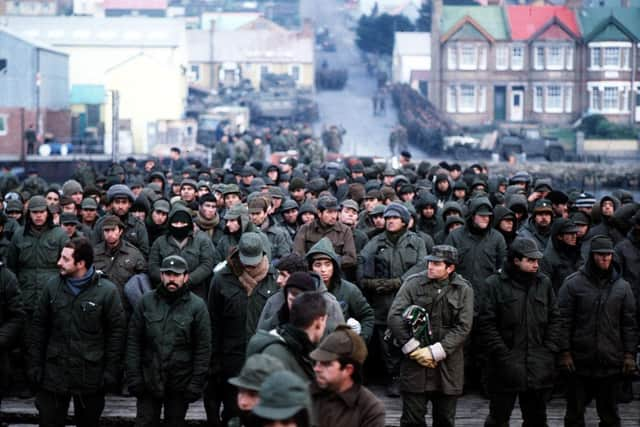

‘I was a 21-year-old Leading Seaman in HMS Antrim, and my action station was controlling the ship’s 4.5-inch guns.
‘I knew little about the place we were about to head for, and even less about why a bunch of scrap metal merchants in South Georgia had led to an Argentine invasion of a British territory 8,000 miles from the UK.
‘Junior rates were rarely historians and strategists in my days as a young sailor! As we had the advantage of being out of the media limelight, unlike the rest of the task force preparing to sail from home, we slipped quietly south as an advance force.
Advertisement
Hide AdAdvertisement
Hide Ad‘One of my first memories was doing a replenishment at sea with HMS Ariadne. We stripped Ariadne of every bit of stores they had in over six hours, every 4.5inch shell and cartridge, every Sea Cat missile, every torpedo and loads of food and chocolate.
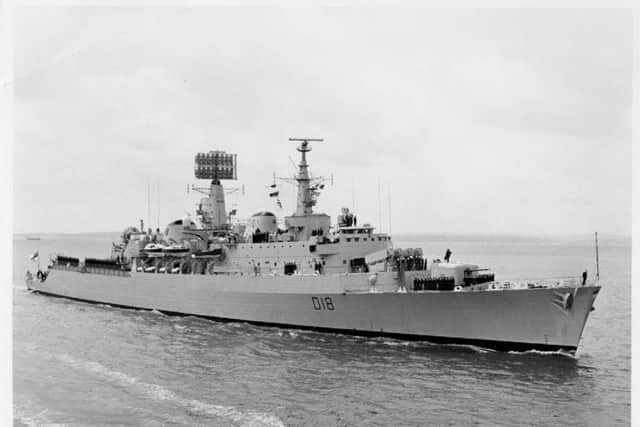

Don’t Cry for Me Argentina
‘At the end of the RAS, and with the two ships close together, speakers appeared on Ariadne’s bridge wing, and they played Julie Covington’s version of "Don’t Cry for Me Argentina” to us, as we waved and broke away.‘It was a very moving moment, especially on reflection.
‘We had an opportunity to write home on the way south, as well as an invitation to write our wills to leave with the mail – an emotional combination.
‘Writing a cheery, "I can’t say much, but don’t worry” letter to mum and dad, whilst knowing you were also writing a will, focused our minds, but I guess we all still thought it would be resolved through diplomacy and common sense. If it wasn’t, we were young and well-trained and we would have to do the job we had been practising for all these years.
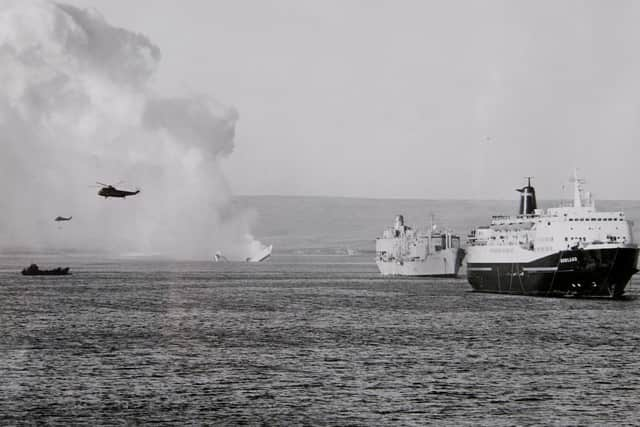

Advertisement
Hide AdAdvertisement
Hide Ad‘Ascension Island was about half-way there and we stopped for further replenishment. I remember being landed by helicopter, as part of a stores party.
‘By now, parcels from home had made their way to us, with letters and essential supplies, such as chocolate and sweets (nutty). Sadly, much of the chocolate melted as it sat in the searing heat of the runway at Ascension.
‘On a more serious note, we also embarked SAS and Marines, and had to stop the former from shooting at Albatross for target practice – didn’t they know this was bad luck?
Antrim’s show of force overwhelms Argentines on South Georgia
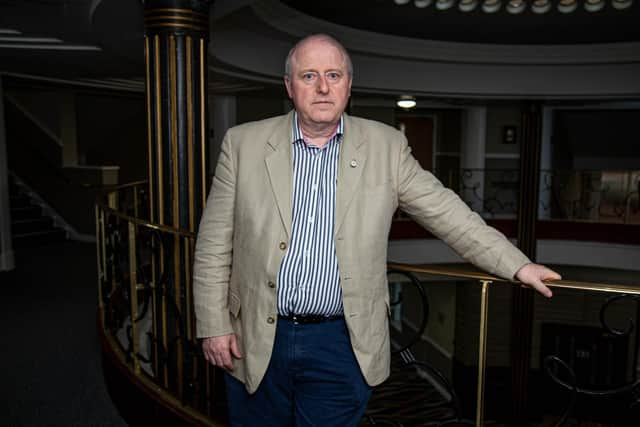

‘Our first operation was the re-capture of South Georgia, which turned out to be quite an adventure. From landing the SAS on Fortuna Glacier before conducting a rescue of the same troops which resulted in the loss of two task force helicopters, to disabling the Argentine submarine ‘Santa Fe’ with a helicopter attack and then conducting a firepower demonstration with our 4.5-inch gun as we landed SAS and Marines ashore to take the surrender.
Advertisement
Hide AdAdvertisement
Hide Ad‘No lives were lost in the operation, with the creeping barrage of our 4.5inch shells being enough to convince the Argentine garrison that we meant business, but sadly an Argentine submariner was shot dead soon after in a misunderstanding when the crippled submarine was being moved in Grytviken.
‘With great respect, he was afforded a full military funeral with sailors from our ship forming a guard of honour.
‘The mood changed significantly when we learned of the loss of HMS Sheffield. It was the first time the seriousness of the conflict hit home for many of us.
‘I remember seeing my boss, Petty Officer ‘Bomber’ Wells, come down the gunners’ mess deck with a bottle of whisky and a glass to check on our wellbeing and reassure us.
Advertisement
Hide AdAdvertisement
Hide Ad‘Despite the whisky, it was a sobering moment, and quite different to the adventure of South Georgia. We now knew that some of us might be on the receiving end, just as Sheffield and our mates on that ship had been.
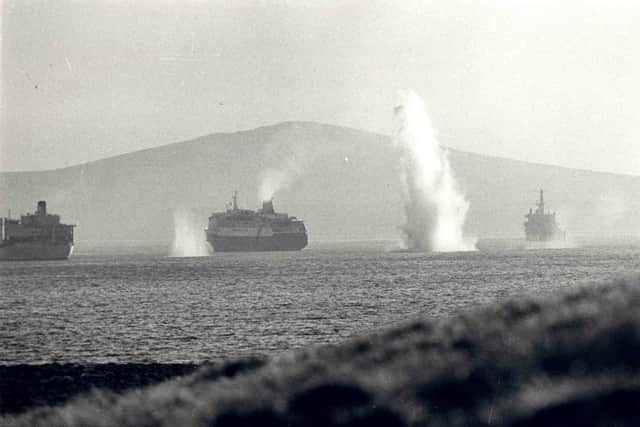

‘The most vivid recollection I have was the day of the landings on May 21, 1982. It’s a day I have marked every year of my life since. Like South Georgia and the subsequent loss of HMS Sheffield, it too was a game of two halves, with the task force way ahead in the first half, and on the back foot in the second.
Storming into San Carlos felt like Merlin unleashing the forces of darkness
‘In the first half, I remember slipping into San Carlos water, under cover of darkness, and ahead of the main landing force. Once safely past the headland with HMS Ardent ahead of us, we worked with troops ashore to bombard the enemy positions on Fanning Head that guarded the entrance to our landing beaches and threatened the ships on approach.
‘After our first ranging rounds landed, to the surprise of the Argentine troops, the message from the spotter ashore of "no corrections, fire for effect” was met with cheers on board and quiet satisfaction from our gunnery team and navigator, whose years of training and endless exercises were so clearly endorsed in a single sentence over a crackling radio circuit.
Advertisement
Hide AdAdvertisement
Hide Ad‘The spotter ashore saw the flashes of our guns and later wrote that they were "bang on target”, and that he “felt like Merlin unleashing the forces of darkness”.
‘It was my job to operate the gunnery computer and press the trigger that fired the guns – a necessary military action in 1982 to protect our own ships and troops, but one that causes some sad reflection when I think about the effect that "Merlin’s forces of darkness” had upon the young men at the other end of our bombardment.
‘In the second half, and with the arrival of daylight, came the arrival of the Argentine Air Force, and the mood changed. From being in control of the situation in the early hours of darkness as we moved our paras and marines ashore, to being on the defensive as Argentine aircraft appeared overhead on bombing and strafing runs against our warships.
Argentine air attacks were relentless and frightening
‘Without doubt, the hours that followed were the most frightening and frenetic. The odds were seriously against us, as Skyhawk and Dagger jet aircraft dropped their bombs, fired their rockets and strafed us with their cannons – I’m sure that many of us thought that the 21st of May might be our last, and with good reason.
Advertisement
Hide AdAdvertisement
Hide Ad‘We were configured for open-ocean warfare against high altitude aircraft, not for short-range defence in a body of water surrounded by hills. For some, very sadly, it was their last day.
‘Hearing our gun director on the upper deck report what was to be the loss of HMS Ardent still fills me with great sorrow, forty years after I heard the sadness in his voice as he reported what he saw in San Carlos.
‘In HMS Antrim, we were very lucky. In the heat of the battle a 1,000lb bomb hit our ship, penetrating our Sea Slug main missile magazine and coming to rest in our aft heads (toilets). Mercifully, it didn’t explode and was the subject of many hours of effort after the battle to cut a hole in the flight deck and gently lower it over the side – a testament to the men that achieved this.
‘One moment of lightness and "Jack” humour, was when a broadcast was made saying that “the after heads will be out of action until further notice” – I expect that few would have relaxed sitting in a cubicle next to the one where an unexploded bomb had come to rest!
Advertisement
Hide AdAdvertisement
Hide Ad‘Our ship ended the day like a pepper pot, full of cannon and rocket holes. Sadly, some of our shipmates had life-changing wounds, but we were afloat – which would not have been the case had the bomb detonated in our main missile magazine – doubtless the reason that we were withdrawn from the place that would be named “Bomb Alley” at the end of the day.
‘The good news is that our objective was achieved, the troops were landed ashore without loss and the amphibious ships were generally unharmed in the process. Our Sea Harriers, like airborne cavalry, arrived overhead and shifted the balance of power in the air battle, although our enemy still had the upper hand and wreaked havoc amongst our ships that day and in those that followed.’
An adventure that was exciting and terrifying in equal measure
Looking back on the war and Ian says he struggles with his mixed emotions.
‘As a 21-year-old sailor, the Falklands War was both an exciting adventure and a terrifying experience in equal measure,’ he writes.
Advertisement
Hide AdAdvertisement
Hide Ad‘The mood of the day was one of determination, optimism and brotherhood – without this, it would be hard to get through such an ordeal, because armed conflict is an ordeal for everyone involved.
‘It’s exciting when you are bombarding the shores of South Georgia in a firepower demonstration that forces the Argentine garrison to run up the white flag, but when the tables are turned and you hear of the loss of shipmates and other ships, as we did all too often, or you fight to prevent determined fighter bombers from sinking your ship, then the excitement stops and the fear begins.
‘But thanks to good leadership, excellent training, and the fact that you rely upon the man next to you just as much as he relies upon you, helps you get through it.’
‘I was one of the lucky ones to return home’
Looking back on the invasion, Ian adds: ‘I am one of the lucky ones who returned home and lived the past forty years in happiness with a loving family and in good health, but I never, ever forget those we left behind, or indeed the ones that came home as different people to the young men that sailed south in 1982, on land, on sea and in the air.
Advertisement
Hide AdAdvertisement
Hide Ad‘Some suffered life-changing physical injuries, and many have injuries you cannot see but are debilitating in ways that only they and their families know. I will also never forget the Argentine soldiers, sailors and airmen who opposed us in the south Atlantic.
‘We may not have shared the same views on the islands, but we shared the same dangers and, sometimes, the same fate. It is our duty to honour the memory of those who never returned, and to look after those who did – a duty that I will personally carry for the rest of my life.’
:: Based in the Royal Maritime Club, in Queen Street, Portsea, Veterans Outreach Support (VOS) has been providing a monthly Drop-In facility for ex-serviceman and their direct family members since July 2008. This facility has now been extended to the Isle of Wight and also includes wellbeing, clinical mental health and welfare support. For details, see vosuk.org
Looking for the latest Royal Navy updates from Portsmouth? Join our new Royal Navy news Facebook group to keep up to date.
A message from the Editor, Mark Waldron
You can subscribe here for unlimited access to our online coverage, including Pompey, with 70 per cent fewer adverts for less than 20p a day.
Comment Guidelines
National World encourages reader discussion on our stories. User feedback, insights and back-and-forth exchanges add a rich layer of context to reporting. Please review our Community Guidelines before commenting.